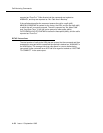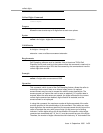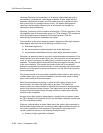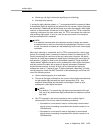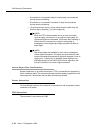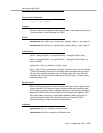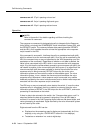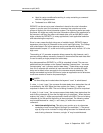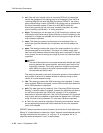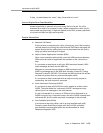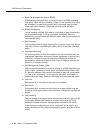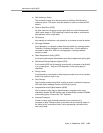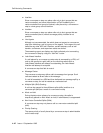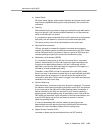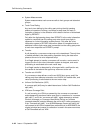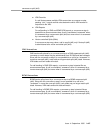
Call Vectoring Commands
A-38 Issue 4 September 1995
■ ani: If the call is an internal call or an incoming DCS call, this data type
causes the extension of the calling party to be outpulsed. If the call is an
incoming ISDN-PRI call with ANI (BN) provided to DEFINITY, the calling
party number/billing number (CPN/BN) of the calling party is outpulsed to
the voice information system. If there is no ANI (BN) to send, the
end-of-string pound sign (#) is the only character outpulsed. Any other
type of incoming call results in ‘‘#’’ being outpulsed.
■ digits: This data type can be used only if Call Prompting is optioned, and
it causes the most recent set of digits collected in vector processing to be
outpulsed. If no digits are available, the end-of-string pound sign (#) is the
only character outpulsed.
■ none: This data type causes no characters to be outpulsed. Also, no
end-of-string pound character (#) is outpulsed, and no time delays are
invoked.
■ qpos: This data type causes the value of the queue position of a call in a
nonconverse split to be outpulsed. This value is a variable length data
item from which between one and three digits can be outpulsed. If the call
is not queued, the end-of-string pound sign (#) is the only character that is
outpulsed.
NOTE:
The use of this keyword is not recommended with multiple split (skill)
queuing because any queue position value that is sent may not be
meaningful. However, if the call is queued to multiple nonconverse
splits (skills), the value of the caller’s queue position in the first
nonconverse split (skill) is sent.
This data may be used by the voice information system to inform callers of
their position in queue or to decide whether to execute a long or short
version of a voice response script.
■ vdn: This data type causes the VDN extension to be outpulsed. In cases
where multiple VDNs are accessed, normal VDN override rules determine
which VDN extension is outpulsed.
■ wait: This data type can be used only if the “Vectoring (G3V4 Advanced
Routing)” customer option is enabled. It causes the expected wait time of
the call to be outpulsed. See "VDN Calls" on page 6-12 for a detailed
description of expected wait time. If the call is not queued or if it is queued
only to splits that are unstaffed or splits where all agents are in AUX work
mode, the end-of-string character “#” is the only character outpulsed.
■ #: This is the only character outpulsed. Outpulsing this character causes
the corresponding
prompt and collect
command in the voice response
script to be skipped.
DEFINITY always outpulses a pound character (#) at the end of each digit string.
Where ‘‘#’’ is administered, or where the ‘‘digits’’ keyword is administered and the
last digit collected from the caller is ‘‘#,’’ only one ‘‘#’’ is outpulsed. No ‘‘#’’ is
outpulsed when the keyword ‘‘none’’ is administered.



